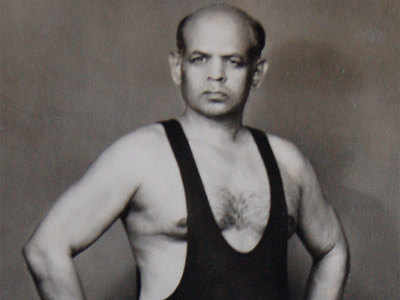Khashaba Dadasaheb Jadhav was an Indian athlete. He is best known as a wrestler who won a bronze medal at the 1952 Summer Olympics in Helsinki. He was one of the first athletes from India to win a medal in the Olympics.
After Norman Pritchard who won two silver medals in athletics in 1900, Khashaba was the first individual athlete from India to win a medal at the Olympics. In the years before Khashaba, India would only win gold medals in field hockey, a team sport. He is the only Indian Olympic medalist who never received a Padma Award. Khashaba was extremely nimble on his feet, which made him different from other wrestlers of his time. English coach Rees Gardner saw this trait in him and trained him prior to the 1948 Olympic games.
His father Dadasaheb was a wrestling coach and he initiated Khashaba into wrestling at the age of five. His wrestling mentors in college were Baburao Balawde and Belapuri Guruji. His success in wrestling did not avoid him from getting good grades.
Jadhav’s first feel of the big stage was at the 1948 London Olympics, his journey to the 1948 London Olympics was funded by the Maharaja of Kohlapur. During his stay in London, he was trained by Rees Gardner, a former lightweight World champion from the United States. It was Gardner’s guidance that saw Jadhav finish sixth in the flyweight section, despite being unfamiliar with wrestling on the mat. He stunned the audience in the 1948 Olympics in London by defeating the Australian wrestler Bert Harris in the first few minutes of the bout. He went on to defeat Billy Jernigan of USA, but lost to Mansour Raisi of Iran, to be eliminated from the tournament.
| Res. | Opponent | Score | Date | Event | Location | Notes |
|---|---|---|---|---|---|---|
| Win | Bert Harris | 3-0 | 1948-07-29 | 1948 Summer Olympics Men’s Flyweight, Freestyle | London | Rank 2T |
| Win | Billy Jernigan | 3-0 | 1948-07-30 | 1948 Summer Olympics Men’s Flyweight, Freestyle | London | Rank 3 |
| Loss | Mansour Raisi | Tech. Fall; 5:31 | 1948-07-30 | 1948 Summer Olympics Men’s Flyweight, Freestyle | London | Rank 6 (Eliminated) |
RETURN FROM THE 1948 SUMMER OLYMPICS
For the next four years, Jadhav trained even harder for the Helsinki Olympics where he moved up in weight and participated in the 125 lb bantamweight category which saw wrestlers from twenty-four different countries, he increased the tempo of his preparation for the next Olympics in Helsinki.
He was honoured by making him a part of the torch run at the 1982 Asian Games in Delhi.
- The Maharashtra Government awarded the Chhatrapati Puraskar posthumously in 1992-1993.
- He was posthumously honoured with the Arjuna Award in 2001.
- The newly-built wrestling venue for the 2010 Delhi Common Wealth Games was named after him to honour his achievement

